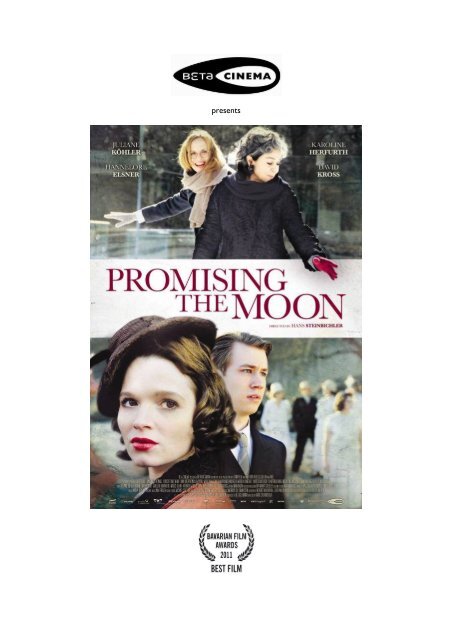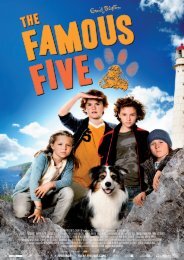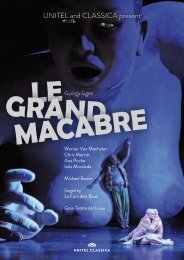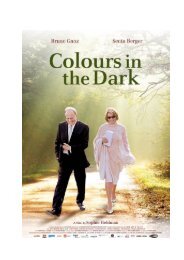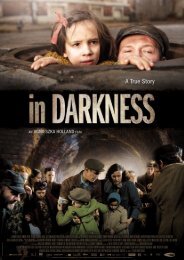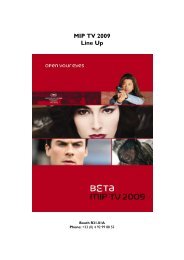Download PDF - Unitel
Download PDF - Unitel
Download PDF - Unitel
Create successful ePaper yourself
Turn your PDF publications into a flip-book with our unique Google optimized e-Paper software.
presents
Director<br />
Hans Steinbichler<br />
Screenplay<br />
Josephin Thayenthal and Robert Thayenthal<br />
Starring<br />
Juliane Köhler, Hannelore Elsner,<br />
Karoline Herfurth, Niklas Kohrt, David Kross,<br />
Rüdiger Vogler, Matthias Brandt, Fritzi Haberlandt a.o.<br />
Production<br />
die film gmbh in coproduction with Sam Film<br />
Producer<br />
Uli Aselmann<br />
Supported by<br />
Deutscher Filmförderfonds (DFFF), Filmstiftung NRW, FilmFernsehFonds Bayern (FFF), Medienboard<br />
Berlin-Brandenburg (MBB), Filmförderungsanstalt (FFA), Wirtschaftliche Filmförderung Mecklenburg-<br />
Vorpommern, Beauftragter für Kultur und Medien (BKM)<br />
with the participation of WDR, ARD Degeto, BR and Arte<br />
CAST<br />
Sofia Schleier<br />
Marga Baumanis<br />
Marga Baumanis (young)<br />
Juris Baumanis<br />
Osvalds Kalnins (young)<br />
Osvald Kalnins<br />
Lorenz Schleier<br />
Juliane Köhler<br />
Hannelore Elsner<br />
Karoline Herfurth<br />
Niklas Kohrt<br />
David Kross<br />
Rüdiger Vogler<br />
Matthias Brandt<br />
For further information:<br />
Beta Cinema Press, Dorothee Stoewahse, Tel: + 49 89 67 34 69 15, Mobile: + 49 170 63 84 627<br />
press@betafilm.com, www.betacinema.com.<br />
Pictures and filmclips available on ftp.betafilm.com, username: ftppress01, password: 8uV7xG3tB<br />
2
CREW<br />
Director<br />
Screenplay<br />
Producer<br />
Co-Producer<br />
with the participation of<br />
Cinematography<br />
Stage Design<br />
Costumes<br />
Make-Up<br />
Music<br />
Hans Steinbichler<br />
Josephin Thayenthal, Robert Thayenthal<br />
Uli Aselmann, die film gmbh<br />
Ewa Karlström, Andreas Ulmke-Smeaton,<br />
Sam Film<br />
WDR - Anke Krause, Gebhard Henke<br />
ARD Degeto - Jörn Klamroth<br />
BR - Bettina Reitz, Cornelia Ackers<br />
Arte - Barbara Häbe, Andreas Schreitmüller<br />
Bella Halben<br />
Evi Stiebler<br />
Katharina Ost<br />
Waldemar Pokromski, Anette Keiser<br />
Niki Reiser<br />
TECHNICAL DATA<br />
Format: 35mm, color<br />
Sound: Dolby Digital<br />
Length (in meters): 2836<br />
Running time: 99 Min.<br />
Language: German<br />
CONTACT INTERNATIONAL PRESS:<br />
Beta Cinema, Dorothee Stoewahse<br />
Tel: + 49 89 67 34 69 15<br />
Mobile: + 49 170 63 84 627<br />
press@betafilm.com<br />
CONTACT WORLD SALES:<br />
Beta Cinema, Dirk Schuerhoff/Andreas Rothbauer<br />
Tel: + 49 89 67 34 69 80<br />
Fax: + 49 89 67 34 69 888<br />
beta@betacinema.com<br />
www.betacinema.com<br />
For further information:<br />
Beta Cinema Press, Dorothee Stoewahse, Tel: + 49 89 67 34 69 15, Mobile: + 49 170 63 84 627<br />
press@betafilm.com, www.betacinema.com.<br />
Pictures and filmclips available on ftp.betafilm.com, username: ftppress01, password: 8uV7xG3tB<br />
3
BAVARIAN FILM AWARD - Jury’s Statement of 14 January 2011<br />
“Producer Uli Aselmann has realized a most extraordinary film with his production 'Promising the<br />
Moon,' which was stunningly shot in Munich, Wuppertal, Heiligendamm, Berlin and Riga. The<br />
sensitive direction of Hans Steinbichler and his outstanding cast have given rise to an intricate filmic<br />
narrative. It takes the protagonists and, with them, the viewers deep into the past and unfolds in<br />
impressive images a family drama that has been secretly slumbering for decades and that affects and<br />
weighs upon the lives of all concerned. Uli Aselmann has produced a film that is as fascinating as it is<br />
compelling in each and every detail. It not only meets with the highest artistic demands, but also casts<br />
its spell upon the public."<br />
PRESS NOTE<br />
After such successful productions as “Hierankl” and “Winter Journey”, director Hans Steinbichler<br />
takes a journey back into the 1930s and 1990s in his new film. In various historical time frames, he<br />
weaves the family history of Marga – played by Hannelore Elsner and with Karoline Herfurth as the<br />
"young Marga" – and her daughter Sofia, played by Juliane Köhler. One woman, Marga, is losing her<br />
memory and, thus, herself. Only recollections of past times keep flaring up bright and clear and reveal<br />
a Marga who is completely different than the person she seemed to be throughout her life. The<br />
other woman, Sofia, seizes upon Marga's memories in order to find out the truth about her own past<br />
and thus about herself.<br />
Against the background of the life stories of these two women, PROMISING THE MOON movingly<br />
treats the power of love, the impossibility of forgetting, and the power of forgiving. Alongside Juliane<br />
Köhler, Hannelore Elsner and Karoline Herfurth, Hans Steinbichler's top-notch cast also includes<br />
David Kross, Niklas Kohrt, Rüdiger Vogler, Matthias Brandt and Fritzi Haberlandt.<br />
SHORT SYNOPSIS<br />
PROMISING THE MOON is a story about the power of love and forgiveness. Marga (Hannelore<br />
Elsner) has never shown many feelings towards her daughter Sofia (Juliane Köhler). Now, however,<br />
she reveals fears, wounds and a deep longing for her long-dead husband Juris. She loses herself more<br />
and more in her forgetfulness and suddenly craves tenderness like a child. An unaccustomed situation<br />
for Sofia, who, after years of almost no contact with her mother, unexpectedly finds herself having to<br />
take care of her. A difficult situation, too: Marga can sometimes be brusque and sometimes funny;<br />
she lives now in the moment, now far away. As though yearning to be free of her memories, Marga<br />
begins relating stories of things that happened many years ago. Things that Sofia has never heard of.<br />
Prompted by a faint suspicion that the secrets of Marga’s past are important to understanding her<br />
own past, Sofia sets off for Riga with her mother at the spur of the moment. This is where Marga<br />
grew up and where she married Juris. But the more Sofia learns about her mother, the less certain<br />
she becomes about her own identity. As the past becomes clearer, it also emerges that what Marga<br />
had told her about their past together was nothing more than a story carved out of thin air…<br />
For further information:<br />
Beta Cinema Press, Dorothee Stoewahse, Tel: + 49 89 67 34 69 15, Mobile: + 49 170 63 84 627<br />
press@betafilm.com, www.betacinema.com.<br />
Pictures and filmclips available on ftp.betafilm.com, username: ftppress01, password: 8uV7xG3tB<br />
4
SYNOPSIS<br />
“Nothing is where it should be” – and that includes Marga Baumanis (Hannelore Elsner). One day,<br />
during a meeting, her daughter Sofia (Juliane Köhler) is called to the phone: her mother has left her<br />
nursing home without permission and is now in a psychiatric day clinic in Wuppertal, where she must<br />
be picked up. Sofia's relationship with her mother being somewhat tense, her first reaction is denial.<br />
But there's no way around it. Sofia must act, and her husband Lorenz (Matthias Brandt) also makes<br />
this clear. So she sets out from Berlin to Wuppertal…<br />
Sofia is horrified when she sees her mother: how she lies there, how she looks at her… In her<br />
confused state, Marga reveals a yearning for love and closeness that Sofia had never before seen in<br />
her mother. And while Marga speaks of things that Sofia doesn't understand, Sofia suspects that there<br />
is something in her mother's life that weighs so heavily upon her that she wants to break free of it.<br />
But what secret has Marga been hiding all these years<br />
On their way back from the clinic, Marga keeps losing herself in her recollections, reacts<br />
unpredictably, aggressively, or like a small child. Again and again, events from her youth keep<br />
appearing before her mind's eye: her wedding with Juris (Niklas Kohrt), whom she loved above all<br />
else and married against her father's will; how happy she was, how carefree her life was. But the<br />
joyous memories are followed by darker ones that inspire fear and which Marga vehemently tries to<br />
repress. But to no avail…<br />
Sofia, who has always suffered from her mother's lack of warmth and affection, has no time to adjust<br />
to the new situation. But she wants to understand, and does everything in her power to help Marga.<br />
In Berlin, Sofia discovers in Marga's luggage old photos which she had never seen before. They are<br />
pictures of her parents in their youth, from their former home in Latvia – pictures from happier<br />
times. And there is also a photo that shows her father Juris next to a man that Sofia cannot identify.<br />
Marga reacts violently when Sofia asks her about this, but at least Sofia learns that this man was a<br />
friend of the family whose name is Osvalds Kalnins (David Kross / Rüdiger Vogler).<br />
Almost as a foreboding, Sofia senses that she must go to Latvia with her mother. Perhaps she can<br />
help Marga regain control of her memories. And, she secretly hopes, perhaps the journey will help<br />
her, Sofia, to better understand her mother and learn more about her family.<br />
Upon arriving in Riga, they find themselves in the midst of the turmoil of the "Singing Revolution."<br />
But as they pass the street blockades in Riga, other images surface before Marga's eyes, from the<br />
time of the Russian occupation of Latvia in the 1940s. She is beside herself and wants to flee.<br />
Sofia's only hope is Osvalds Kalnins, her father’s friend, who lives in Jūrmala, an idyllic town directly<br />
on the Baltic Sea. This is where Marga grew up and met her husband Juris, and where she spent the<br />
first years of the war. All that Sofia knows from this time is that her parents fled Jūrmala to Germany<br />
during the war.<br />
They find Osvalds in the villa in which Marga spent her childhood. He is overwhelmed to learn who<br />
Sofia is: after all, Marga had written him after the war to inform him that Juris and Sofia had died in an<br />
air-raid bombing. Sofia is upset over this denial of her existence, but suspects there are reasons for<br />
this which Marga has always kept silent about. It is clear to her that Jürmala is the key to Marga's past<br />
and that Osvalds is part of the mystery surrounding Marga.<br />
For further information:<br />
Beta Cinema Press, Dorothee Stoewahse, Tel: + 49 89 67 34 69 15, Mobile: + 49 170 63 84 627<br />
press@betafilm.com, www.betacinema.com.<br />
Pictures and filmclips available on ftp.betafilm.com, username: ftppress01, password: 8uV7xG3tB<br />
5
Sofia plunges deeper and deeper into Marga's past in order to uncover this secret. It will take her far<br />
back into the 1930s, to a young and exuberant Marga, her husband Juris, his friend Osvalds and to a<br />
woman named Iewa (Juta Vanaga / Dace Eversa) whom Sofia had never heard about. It will take her<br />
back to wonderful times, to dramatic events, to a great love and to an even greater suffering.<br />
The more Sofia learns about her mother, the clearer her own identity becomes. And so it emerges<br />
that what Marga had told her about her life and about their past together was carved out of thin<br />
air…<br />
HISTORICAL BACKGROUND<br />
The "Hitler-Stalin Pact" was signed on 23 August 1939. On the basis of this secret agreement, Latvia<br />
fell to the Soviet Union. On 17 June 1940 the Red Army occupied the Latvian territory, which was<br />
then incorporated into the Soviet Union against the will of the Latvian people.<br />
In June 1941 the German Wehrmacht marched into Latvia. Three years later there were major<br />
battles between the German and Soviet armies on Latvian territory, from which the USSR emerged<br />
victorious. During this war, Latvians were called up for military service by both occupation forces,<br />
and even forced to fight against one another.<br />
The following post-war years were marked by particularly cruel reprisals against the Latvian<br />
population. Nearly 120,000 Latvians were arrested and sent to Soviet concentration camps<br />
(GULAGs). 130,000 fled to the West from the Soviet occupation forces. On 25 March 1949, in a<br />
large-scale operation, nearly 43,000 people – mostly from rural areas – were transported from Latvia<br />
to Siberia.<br />
In the second half of the 1980s, the Latvians used the nascent liberalization of the Soviet Union to<br />
establish various political organizations such as, for example, the People's Front, the National<br />
Independent Movement and the Citizen's Congress. These organizations supported the restoration<br />
of Latvia's independence.<br />
On 23 August 1989 the three people's fronts built a live human chain of over several hundred<br />
kilometers from Tallinn via Riga to Vilnius (the Baltic Path) in order to draw attention to the crime of<br />
the Hitler-Stalin Pact that had been in effect for 50 years already. During the protest marches and<br />
demonstrations, the people sang forbidden songs, defiant rock versions of popular Latvian songs that<br />
became summer hits. The concept of the "Singing Revolution" was coined.<br />
A major step in the restoration of Latvia's independence was taken on 4 May 1990. On that day, the<br />
Supreme Council of the Latvian SSR passed a declaration in which the will to restore independence<br />
was expressed, and a period of transition to complete freedom laid down officially.<br />
Moscow was opposed to the Balts' strivings for independence, since they could bring down the<br />
entire Soviet Union. The revolution took its course in the night of 13 January 1991 with the bloody<br />
events in Vilnius, where the Soviet military occupied the Lithuanian Television. Thirteen peaceful<br />
demonstrators were killed. The population of Riga then erected barricades around its radio building<br />
and the Parliament in the old town of Riga to protect them from Soviet attacks. For entire days and<br />
nights, the people kept up their opposition and sang their freedom songs around bonfires in the icy<br />
cold. When the "old guard" revolted against Gorbatchev in Moscow in August 1991, barricades were<br />
For further information:<br />
Beta Cinema Press, Dorothee Stoewahse, Tel: + 49 89 67 34 69 15, Mobile: + 49 170 63 84 627<br />
press@betafilm.com, www.betacinema.com.<br />
Pictures and filmclips available on ftp.betafilm.com, username: ftppress01, password: 8uV7xG3tB<br />
6
again set up in Tallinn, Riga and Vilnius, and songs of solidarity sung. The peaceful revolution in the<br />
Baltics was threatened. But a few days later, the Moscow putsch collapsed.<br />
On 21 August 1991 the Latvian Parliament passed a resolution about the complete restoration of the<br />
Latvian state. The Soviet Union recognized the independence of Latvia in September 1991 along with<br />
the Western democracies.<br />
PRODUCTION NOTES<br />
"I always feel that a film is successful<br />
when it elicits emotions in the viewer –<br />
his can be hearty laughter or commiserating tears."<br />
Uli Aselmann - Producer<br />
When producer Uli Aselmann was offered the first version of the script, sponsored by the FFA, he<br />
was immediately fascinated. Together with director Hans Steinbichler, he proceeded to conceptually<br />
transpose the story penned by Robert and Josephin Thayenthal, and to search for financing. After<br />
nearly a year, he had all the commitments of the sponsoring authorities that he had applied to: the<br />
Deutscher Filmförderfonds (DFFF), the Filmstiftung NRW, the FilmFernsehFonds Bayern (FFF), the<br />
Medienboard Berlin-Brandenburg (MBB), the Filmförderungsanstalt (FFA), the Wirtschaftliche<br />
Filmförderung Mecklenburg-Vorpommern and the support of the German Ministry of Culture as well<br />
as the participation of WDR, ARD Degeto, BR and Arte. Together with the producer’s own<br />
resources, the film has a production budget of around five million euros.<br />
The shooting of the historic scenes surrounding the Baltic "Singing Revolution" took place in Riga.<br />
The Latvians who had lived through the blockade in Riga in August 1991 brought original props onto<br />
the set with them. During the six days of shooting, they showed the German team just how<br />
important it was for them to create a realistic feeling for this important phase of their country. A<br />
liberating recollection of this period and a feeling of triumph spread among the Latvians during the<br />
shoot. Their history is truly special and is almost forgotten today amidst the more spectacular world<br />
events. The film tries to do justice to this period, even if the political background of Latvia from 1933<br />
to 1991 can only be briefly sketched, since it is a family secret that is at the center of the story. "It<br />
was not our intent to make a political film about the history of Latvia. We wouldn't have dared to do<br />
so, and certainly not from our basis in Germany. Latvia's historical background offered us the context<br />
in which we could make a film about humanity, one that concerns human fates," says Uli Aselmann.<br />
For further information:<br />
Beta Cinema Press, Dorothee Stoewahse, Tel: + 49 89 67 34 69 15, Mobile: + 49 170 63 84 627<br />
press@betafilm.com, www.betacinema.com.<br />
Pictures and filmclips available on ftp.betafilm.com, username: ftppress01, password: 8uV7xG3tB<br />
7
DIRECTOR HANS STEINBICHLER about the film<br />
“PROMISING THE MOON is a story about the obstacles<br />
and possibilities of forgiving.”<br />
Hans Steinbichler - Director<br />
Why did you decide to direct PROMISING THE MOON<br />
I am of a generation that has a very concrete relationship to the years of political change in the<br />
1990s. When I look back upon those years, which have remain engraved in my mind, then the most<br />
important were no doubt those between 1986 and 1996. These are the years in which I was growing<br />
up. I felt immediately familiar with the time level of the story of Marga and Sofia.<br />
The script "found" me in June 2008. I think I hadn't read such an exciting and suggestive book about<br />
this time until then. I didn't have to consider for a minute. I immediately sent the two writers Robert<br />
and Josephin Thayenthal a text message: "I'll do it! Absolutely!"<br />
You shot the film in Bavaria, Wuppertal, Heiligendamm and Berlin, as well as at original<br />
locations in Riga. How did the Latvians react to the shooting of a film about their<br />
history<br />
The city of Riga and its population were extremely open and helpful. There were very moving<br />
moments. The revolution of 1991 was recreated on the original locations with the almost identical<br />
number of people who had been on the square at that time. We had nearly 400 Latvian extras. The<br />
people came to the set with tears in their eyes because we brought to life once again, and for a brief<br />
moment, that which they had experienced themselves twenty years earlier: the barricades, the songs,<br />
the posters. Many Latvians feel that their liberation story was eclipsed by the Gulf War which began<br />
only three days later. The film is something like a small contribution to keeping alive the memory of<br />
this period in Latvian history.<br />
Nevertheless, it is not Latvian history that is at the center of the film. Did you<br />
deliberately reduce the historical events to the family tragedy<br />
We continued to develop the script over a period of one and a half years. Not least because the<br />
Latvian history in the original version was described so extensively that we would not have been able<br />
to shoot this for under a two-digit million sum. For me, the historical aspect wasn't so much the<br />
decisive element. In this film, history functions rather like a blueprint. War and clashes of social<br />
systems are the framework that gives rise to stories of relations such as those between Marga and<br />
Sofia. History becomes personal this way.<br />
That sounds like one of your great idols Pedro Almodóvar, for whom both history and<br />
homeland function like strong projection surfaces for the filmic narrative.<br />
That’s true. I am a great admirer of Pedro Almodóvar and consider him as a consummate homeland<br />
filmmaker. To me, "homeland film" doesn't mean wandering around meadows in front of mountains.<br />
Just like Almodóvar who, for example, depicts the situation of gays in Spain in his film 'La mala<br />
educación,' homeland film means understanding one's own surroundings not by aiming to fill a niche,<br />
but by relating stories for many people. This is what I really admire in Almodóvar. With this kind of<br />
For further information:<br />
Beta Cinema Press, Dorothee Stoewahse, Tel: + 49 89 67 34 69 15, Mobile: + 49 170 63 84 627<br />
press@betafilm.com, www.betacinema.com.<br />
Pictures and filmclips available on ftp.betafilm.com, username: ftppress01, password: 8uV7xG3tB<br />
8
closeness to reality, he has been able to tell incredibly radical stories such as 'Todo sobre mi madre.'<br />
I see Pedro Almodóvar above all as a model of narrative style.<br />
It is also the visual idiom which makes the film so remarkable – the weightiness of<br />
personal destinies is placed against the lightness and poetic beauty of the images. A<br />
deliberately chosen contrast<br />
Beauty is extremely important to me - not in the sense of hyping the aesthetic. It's a type of beauty<br />
in which you completely forget that you're moved in places where you really don't want to be moved<br />
that much. That's precisely what I love about movies: that the beauty of images can lead you into<br />
reflecting on terrible things.<br />
And what are you offering viewers with this film<br />
How far do relations go How far can love or friendship go The film asks these questions and<br />
provides the possibility of forgiving as an answer. That is a rather big theme. If we were all able to<br />
forgive, then the world would be a bit further than it is at the moment.<br />
FILMOGRAPHY (selection)<br />
CAST<br />
Juliane Köhler – Sofia Schleier<br />
Title<br />
Director<br />
2011 Promising the Moon Hans Steinbichler<br />
2009 Eden à l’ouest Constantin Costa-Gavras<br />
2008 November Child Christian Schwochow<br />
Adam Resurrected<br />
Paul Schrader<br />
Effi<br />
Hermine Huntgeburth<br />
Anonyma<br />
Max Färberböck<br />
2007 Mondkalb Sylke Enders<br />
2006 Life Actually Alain Gsponer<br />
Auf ewig und einen Tag (TV)<br />
Markus Imboden<br />
2004 Downfall Oliver Hirschbiegel<br />
2002 My First Miracle Anne Wild<br />
2001 Nowhere in Africa Caroline Link<br />
1998 Aimée & Jaguar Max Färberböck<br />
Annaluise and Anton<br />
Caroline Link<br />
Hannelore Elsner – Marga Baumanis<br />
Title<br />
Director<br />
2011 Promising the Moon Hans Steinbichler<br />
2010 Electric Ghetto Uli Edel<br />
The Last Patriarch<br />
Michael Steinke<br />
Hanni and Nanni<br />
Christine Hartmann<br />
2009 Jakobs Bruder Daniel Walta<br />
My Heart in Chile<br />
Jörg Grünler<br />
For further information:<br />
Beta Cinema Press, Dorothee Stoewahse, Tel: + 49 89 67 34 69 15, Mobile: + 49 170 63 84 627<br />
press@betafilm.com, www.betacinema.com.<br />
Pictures and filmclips available on ftp.betafilm.com, username: ftppress01, password: 8uV7xG3tB<br />
9
2007 Cherry Blossoms - Hanami Doris Dörrie<br />
Vivere<br />
Angeline Maccarone<br />
War and Peace (TV)<br />
Robert Dornhelm<br />
2006 Not All Were Murderers Jo Baier<br />
2005 Die Spielerin Erhard Riedlsperger<br />
Rauchzeichen<br />
Rudolf Thome<br />
2004 Go For Zucker! Dani Levy<br />
2003 Frau fährt, Mann schläft Rudolf Thome<br />
Poem<br />
Ralf Schmerberg<br />
2002 Mein letzter Film Oliver Hirschbiegel<br />
Red and Blue<br />
Rudolf Thome<br />
2000 No Place to Go Oskar Roehler<br />
1994 Die Kommissarin (TV) Diverse<br />
- 2005<br />
Karoline Herfurth – Marga Baumanis (young)<br />
Title<br />
Director<br />
2011 Promising the Moon Hans Steinbichler<br />
2010 Vincent Wants to Sea Ralf Huettner<br />
2009 Berlin ’36 Kaspar Heidelbach<br />
2008 A Year Ago in Winter Caroline Link<br />
Das Wunder von Berlin (TV)<br />
Roland Suso Richter<br />
The Reader<br />
Stephen Daldry<br />
2006 Parfume – Story of a Murderer Tom Tykwer<br />
Peer Gynt<br />
Uwe Janson<br />
2004 In Another League Buket Alakus<br />
Girls on Top! 2<br />
Peter Gersina<br />
2003 Mein Name ist Bach Dominique de Rivaz<br />
2002 Big Girls Don’t Cry Maria von Heland<br />
2001 Girls on Top! Dennis Gansel<br />
2000 Crazy Hans-Christian Schmid<br />
David Kross – Osvalds Kalnins (young)<br />
Title<br />
Director<br />
2011 DAS BLAUE VOM HIMMEL Hans Steinbichler<br />
2009 Same But Different Detlev Buck<br />
2008 The Reader Stephen Daldry<br />
Krabat<br />
Marco Kreuzpaintner<br />
2006 Tough Enough Detlev Buck<br />
For further information:<br />
Beta Cinema Press, Dorothee Stoewahse, Tel: + 49 89 67 34 69 15, Mobile: + 49 170 63 84 627<br />
press@betafilm.com, www.betacinema.com.<br />
Pictures and filmclips available on ftp.betafilm.com, username: ftppress01, password: 8uV7xG3tB<br />
10
Matthias Brandt – Lorenz Schleier<br />
Title<br />
Director<br />
2011 Promising the Moon Hans Steinbichler<br />
2010 Das Medium (TV) Jan Bonny, Oliver Schwabe<br />
2009 Livestream Jens Wischnewski<br />
Freche Mädchen<br />
Ute Wieland<br />
Die Tochter des Mörders<br />
Johannes Fabrick<br />
Der Test (TV)<br />
Marc Schlichter<br />
2008 My Mother, My Bride and I Hans Steinbichler<br />
Todsünde (TV)<br />
Matti Geschonneck<br />
Die Frau, die im Wald verschwand (TV) Oliver Storz<br />
2007 Side Effects (TV) Adolf Winkelmann<br />
Counterparts<br />
Jan Bonny<br />
2006 Hannah Erika von Möller<br />
Vineta<br />
Franziska Stünkel<br />
2005 The Kaminski Case Stephan Wagner<br />
Leo (TV)<br />
Vivian Naefe<br />
2003 In the Shadow of Power (TV) Oliver Storz<br />
2002 Big Girls Don’t Cry Maria von Heland<br />
CREW<br />
Hans Steinbichler – Director<br />
Hans Steinbichler was born in Solothurn, Switzerland, in 1969 and grew up in the Chiemgau in<br />
Bavaria. During his studies, he worked as a photographer and journalist. He began to study law after<br />
secondary school, but broke this off to take up a course of study at the Munich Hochschule für<br />
Fernsehen und Film instead. After shooting short films and biographical documentaries there, he<br />
presented his film “Hierankl” (2003) – for which he was able to enlist the participation of such great<br />
film personalities as Josef Bierbichler, Barbara Sukowa and Johanna Wokalek – as his graduation<br />
project, which won plaudits from the press and the public. For his first work he obtained the<br />
Advancement Prize of the Munich Filmfest for best direction as well as the Bavarian Film Award and<br />
the Adolf Grimme Award. His acting ensemble was also honored with the latter. In 2006 Hans<br />
Steinbichler directed “Winter Journey”, which again starred Josef Bierbichler, this time next to<br />
Hanna Schygulla and Sibel Kekilli. Bierbichler obtained the Lola for his achievement in this film;<br />
moreover, “Winter Journey” was also nominated for the best film. In 2007 he realized the film<br />
experiment “Autistic Disco” – a drama about social outcasts that Steinbichler developed jointly with<br />
acting students of an art academy. One year later he shot the drama “My Mother, My Bride and I”<br />
with Monica Bleibtreu, Matthias Brandt and Maria Popistasu, and obtained an Adolf Grimme Award<br />
as director for it. Also in 2008 Hans Steinbichler shot the short film “Fraktur”, his contribution to<br />
the compilation film Deutschland 09, with which 13 German directors expressed their thoughts on<br />
the state of the nation through short films. The world premiere was screened at the Berlinale in<br />
2009.<br />
For further information:<br />
Beta Cinema Press, Dorothee Stoewahse, Tel: + 49 89 67 34 69 15, Mobile: + 49 170 63 84 627<br />
press@betafilm.com, www.betacinema.com.<br />
Pictures and filmclips available on ftp.betafilm.com, username: ftppress01, password: 8uV7xG3tB<br />
11
Title<br />
2011 Promising the Moon Director<br />
2009 Meine Heimat - Die Halbe Wahrheit (TV) Director, Script<br />
Fraktur - Deutschland 09 (Episode 7) Director, Script<br />
2008 My Mother, My Bride and I (TV) Director<br />
2007 Autistic Disco Director, Production<br />
2006 Winter Journey Director<br />
Bella Block: Mord unterm Kreuz<br />
Director<br />
2003 Hierankl Director, Script<br />
Bella Halben – Cinematography<br />
Bella Halben was born and raised in Hamburg, and, after her training as an advertising photographer,<br />
worked as assistant camerawoman and operator in the fields of news reporting, commercials and<br />
feature films. Since 1990 she has been active as a freelance camerawoman and has shot a number of<br />
feature films. She filmed Christopher Roth’s films “Looosers” (1995), “Candy” (1998) and “Baader”<br />
(2001), which obtained the Alfred Bauer Award at the 2002 Berlinale. In 2001 she shot Nicolette<br />
Krebitz’ directing debut “Jeans”, as well as her second film “The Heart Is a Dark Forrest” in 2006. In<br />
2003 she was in charge of photographing “Hierankl”, the first film which she made with Hans<br />
Steinbichler, and for which she obtained the Adolf Grimme Award in Gold and a nomination for the<br />
German Camera Award. Also in 2003 she shot “Aus der Tiefe des Raumes” (Director: Gil Mehmert),<br />
in 2004 “Eine andere Liga” (Director: Buket Alakus); in 2005 the episodes “Mord unterm Kreuz”<br />
(Director: Hans Steinbichler) and “Das Glück der Anderen” of the ZDF production “Bella Block”.<br />
Halben collaborated again with Hans Steinbichler in “Winter Journey” in 2005, “Autistic Disco” in<br />
2006, as well as the episode “Fraktur” for the compilation film Deutschland 09 in 2008. In 2007 Bella<br />
Halben wielded the camera for Caroline Link’s “A Year Ago in Winter” – for which she obtained a<br />
nomination for the German Camera Award. It was followed in 2008 by “The Door” (Director: Anna<br />
Saul), the TV two-parter “Der Kommissar und das Meer” (Director: Marcus Weiler), the TV fairy<br />
tale “Dornröschen” in 2009, which also starred Hannelore Elsner, “Hier kommt Lola” (Director:<br />
Franziska Buch) as well as the documentary film “Meine Heimat – Die halbe Wahrheit” (Director:<br />
Hans Steinbichler).<br />
Title<br />
Director<br />
2011 Promising the Moon Hans Steinbichler<br />
2009 The Door Anno Saul<br />
Meine Heimat - Die Halbe Wahrheit (TV) Hans Steinbichler<br />
Fraktur - Deutschland 09 (Episode 7) Hans Steinbichler<br />
Dornröschen (TV)<br />
Oliver Dieckmann<br />
2008 A Year Ago in Winter Caroline Link<br />
Der Kommissar und das Meer (TV)<br />
Marcus Weiler<br />
2007 The Heart Is a Dark Forrest Nicolette Krebitz<br />
Autistic Disco<br />
Hans Steinbichler<br />
2006 Winter Journey Hans Steinbichler<br />
Bella Block: Mord unterm Kreuz (TV) Hans Steinbichler<br />
2005 Bella Block: Das Glück der anderen (TV) Christian von Castelberg<br />
2004 Aus der Tiefe des Raumes Gil Mehmert<br />
For further information:<br />
Beta Cinema Press, Dorothee Stoewahse, Tel: + 49 89 67 34 69 15, Mobile: + 49 170 63 84 627<br />
press@betafilm.com, www.betacinema.com.<br />
Pictures and filmclips available on ftp.betafilm.com, username: ftppress01, password: 8uV7xG3tB<br />
12
2004 Eine andere Liga Buket Alakus<br />
2003 Hierankl Hans Steinbichler<br />
2001 Baader Christopher Roth<br />
Jeans<br />
Nicolette Krebitz<br />
Uli Aselmann / die film gmbh – Producer<br />
Born in Hamburg in 1957, Uli Aselmann studied German literature and musicology at the University<br />
of Bielefeld, worked as assistant director at Ida Ehre’s Hamburger Kammerspiele and financed his<br />
studies at the Hochschule für bildende Künste in Hamburg as assistant director, radio producer and<br />
radio-play director at the NDR. After obtaining his film degree at the Hochschule für bildende<br />
Künste in Hamburg with the graduation film “Drei mal drei”, he worked as floor manager, designer<br />
and production manager for various German and international TV productions, and produced further<br />
short films of his own (including “Gefahren der Sehnsucht”).<br />
In 1992 he was hired by Jürgen Kriwitz for the neue deutsche Filmgesellschaft (ndF) in Munich. Here<br />
Aselmann produced commercials (with, among others, Helmut Dietl for the “Deutsche<br />
Fernsehlotterie”), series (including “Schloss Hohenstein,” “Um die 30”), theatrical films (e.g. „Der<br />
kalte Finger“) and TV movies for practically all German broadcasters (including “Amerika,” “Die<br />
Chaosqueen,” “Falsche Liebe”). Ralf Huettner’s police comedies “Die Musterknaben” became a kind<br />
of trademark for the producer Aselmann; in 1997 he was granted the First Movie Award at the<br />
Munich Filmfest for the best production achievement. In the same year he was nominated for the<br />
German Film Award as best producer for “Der Neffe” (director: Gabriela Zerhau).<br />
In 1997 Uli Aselmann founded die film gmbh and has since been the general manager and producer of<br />
this firm as well as of the subsidiary companies a.pictures film & tv. production.gmbh in Hamburg and<br />
cut.it film- und postproduktions gmbh in Stuttgart. Since July 2009 Andreas Ch. Tönnessen has been<br />
co-partner of die film gmbh. die film gmbh has also been the principal shareholder of the film<br />
production company TANGRAM International GmbH, specialized in documentaries, since 2010. The<br />
firms have made more than 80 productions to date, many of which have been nominated for German<br />
and international awards and have won awards in various categories. For example, the feature film<br />
“Vaya con Dios” was honored with the “VGF Award for the best film of a young cinema producer<br />
2001” at the Bavarian Film Awards in 2002. There were also successful theatrical films such as<br />
“Grenzverkehr” (2004: Director: Stefan Betz), “Meine Mutter, mein Bruder und Ich!” (2006;<br />
Director: Nuran D. Calis) as well as “Winter Journey” (2005: Hans Steinbichler), which was not only<br />
nominated as best film for the German Film Awards in 2007 and won Josef Bierbichler a Lola as best<br />
actor, but was also awarded the Fipresci Critics’ Award and the Jury Award in Brooklyn. The<br />
coproduction “Autistic Disco”, again with Steinbichler, had its theatrical release in October 2008 and<br />
was successful at many international festivals. “Die Perlmutterfarbe” (Director: Marcus H.<br />
Rosenmüller) had its theatrical release in spring 2009 and was also a hit at many festivals (BUSTER<br />
Copenhagen International Film Festival 2009 – Best Film; Castellinaria Film Festival 2009 – awarded<br />
the “Castello d’oro”; children’s media award 2009 for Markus Krojer). In 2010 die film gmbh<br />
produced the theatrical film “Dreiviertelmond” (script and direction: Christian Zübert),which is<br />
coming to German cinemas in fall 2011. The latest award for the firm was the Bavarian Film Award<br />
on 14 January 2011 for Best Production for PROMISING THE MOON.<br />
For further information:<br />
Beta Cinema Press, Dorothee Stoewahse, Tel: + 49 89 67 34 69 15, Mobile: + 49 170 63 84 627<br />
press@betafilm.com, www.betacinema.com.<br />
Pictures and filmclips available on ftp.betafilm.com, username: ftppress01, password: 8uV7xG3tB<br />
13
Uli Aselmann is cinema-section chairman and deputy chairman of the management board of the<br />
Allianz Deutscher Produzenten – Film & Fernseh and, since February 2009, executive committee<br />
member of the Filmförderungsanstalt (FFA).<br />
Aselmann is a member of the Deutsche Filmakademie and die film gmbh has been a sustaining<br />
member of the Deutsche Filmakademie since 2004.<br />
Title<br />
Director<br />
2011 Promising the Moon Hans Steinbichler<br />
2010 Dreiviertelmond Christian Zübert<br />
2009 Die Perlmutterfarbe Markus H. Rosenmüller<br />
2007 Autistic Disco Hans Steinbichler<br />
2006 Meine Mutter, mein Bruder und ich! Nuran David Calis<br />
2005 Winter Journey Hans Steinbichler<br />
2004 Grenzverkehr Stefan Betz<br />
2003 Aus der Tiefe des Raumes Gil Mehmert<br />
2002 Die Musterknaben 3 Ralf Huettner<br />
2000 Vaya con Dios Zoltan Spirandelli<br />
And many TV movies<br />
www.diefilmgmbh.de<br />
Robert Thayenthal and Josephin Thayenthal – Screenplay<br />
Robert Thayenthal was born in Graz, Austria, where he studied theater directing at the Hochschule<br />
für Musik und Darstellende Kunst. After completing his studies, he worked for several years as a<br />
freelance director at many theaters in Germany and Austria and wrote stage plays, radio plays and<br />
novels. For more than 20 years now he has been writing successful scripts for movies and TV.<br />
Josephin Thayenthal studied art history at Berlin's Humboldt University and was active for several<br />
years as an art historian specializing in contemporary art. She came to filmmaking and writing through<br />
the study of Experimental Film Design and Narrative Film at the Hochschule der Künste Berlin.<br />
Robert and Josephin Thayenthal have been working together since 2006. In 2009 they were<br />
nominated for the German Script Award for their first joint screenplay, PROMISING THE MOON.<br />
Also in 2009 their script “Amselherz” obtained a nomination for the Script Award of the<br />
International Filmfest in Emden.<br />
Robert and Josephin Thayenthal live in Berlin.<br />
Niki Reiser – Music<br />
Niki Reiser was born in Aargau (Switzerland) in 1958. He studied jazz and classical music at the<br />
Berklee School of Music in Boston, majoring in film music. Among his later teachers were Ennio<br />
Morricone and Jerry Goldsmith. In the early 1980s he wrote mainly film scores for American film<br />
productions and toured through the U.S. as a jazz flute player with his ensemble People. Reiser<br />
returned to Europe in 1986 and began his long-term collaboration with film director Dany Levy. Ten<br />
years later he wrote the film score to Caroline Link's debut film “Beyond Silence”. His soundtrack to<br />
the Oscar-nominated film sold over 200,000 copies and won the German Film Award in 1997. His<br />
For further information:<br />
Beta Cinema Press, Dorothee Stoewahse, Tel: + 49 89 67 34 69 15, Mobile: + 49 170 63 84 627<br />
press@betafilm.com, www.betacinema.com.<br />
Pictures and filmclips available on ftp.betafilm.com, username: ftppress01, password: 8uV7xG3tB<br />
14
musical talent was again confirmed at a variety of theaters throughout the world. He appeared with<br />
Kol Simcha on his world tour from 1997 to 1999, and played at Carnegie Hall and the Montreux Jazz<br />
Festival. Today he has a studio in Basel and has been in the managing board of the Deutsche<br />
Filmakademie since its founding in 2003.<br />
Soundtracks (selection):<br />
Title:<br />
Director:<br />
2011 Promising the Moon Hans Steinbichler<br />
2009 Maria, He Doesn’t Like It Neele Vollmar<br />
The Wild Chicks and Life<br />
Vivian Naefe<br />
2008 A Year Ago in Winter Caroline Link<br />
2007 Love Life Maria Schrader<br />
2006 My Führer Dany Levy<br />
2005 The White Massai Hermine Huntgeburth<br />
Go For Zucker!<br />
Dany Levy<br />
2004 Summer Storm Marco Kreuzpaintner<br />
2002 The Flying Classroom Tomy Wigand<br />
I’m the Father<br />
Dany Levy<br />
2001 Nowhere in Africa Caroline Link<br />
Heidi<br />
Markus Imboden<br />
Awards (Selection):<br />
German Film Award:<br />
1997 – Beyond Silence; 1999 - Meschugge, Annaluise & Anton; 2002 – Nowhere in Africa; 2005 – Go<br />
For Zucker!<br />
Bavarian Film Award:<br />
1996 – Silent Night<br />
Swiss Film Music Award<br />
2001 – Cold Is the Breath of Evening<br />
Award of the German Film Critics<br />
2004 – The Flying Classroom<br />
BETA CINEMA (World Sales)<br />
Beta Cinema is the theatrical division of Beta Film. Launched in 2001, Beta Cinema has established<br />
itself as a "boutique operation" for independent feature films with strong potential for theatrical<br />
distribution. Beta Cinema's philosophy is to limit its selective acquisition policy of 10 to 15 titles per<br />
year in order to fully develop the theatrical potential of each title according to its individual<br />
character. Beta Cinema’s portfolio includes outstanding productions like JOHN RABE, which won<br />
four German Film Awards 2009, Cannes 2008 Jury Prize-winning IL DIVO, Academy Award 2008-<br />
winning THE COUNTERFEITERS, Academy Award 2008 nominated MONGOL, Academy Award<br />
2007-winning THE LIVES OF OTHERS and the Academy Award 2005-nominated DOWNFALL.<br />
For further information:<br />
Beta Cinema Press, Dorothee Stoewahse, Tel: + 49 89 67 34 69 15, Mobile: + 49 170 63 84 627<br />
press@betafilm.com, www.betacinema.com.<br />
Pictures and filmclips available on ftp.betafilm.com, username: ftppress01, password: 8uV7xG3tB<br />
15


